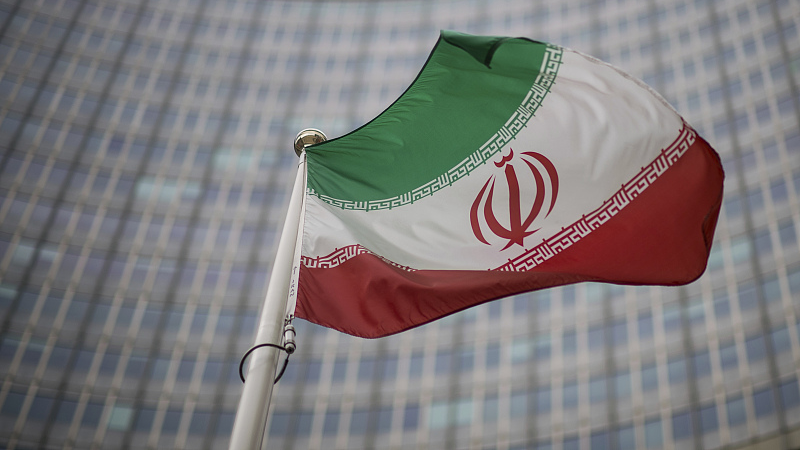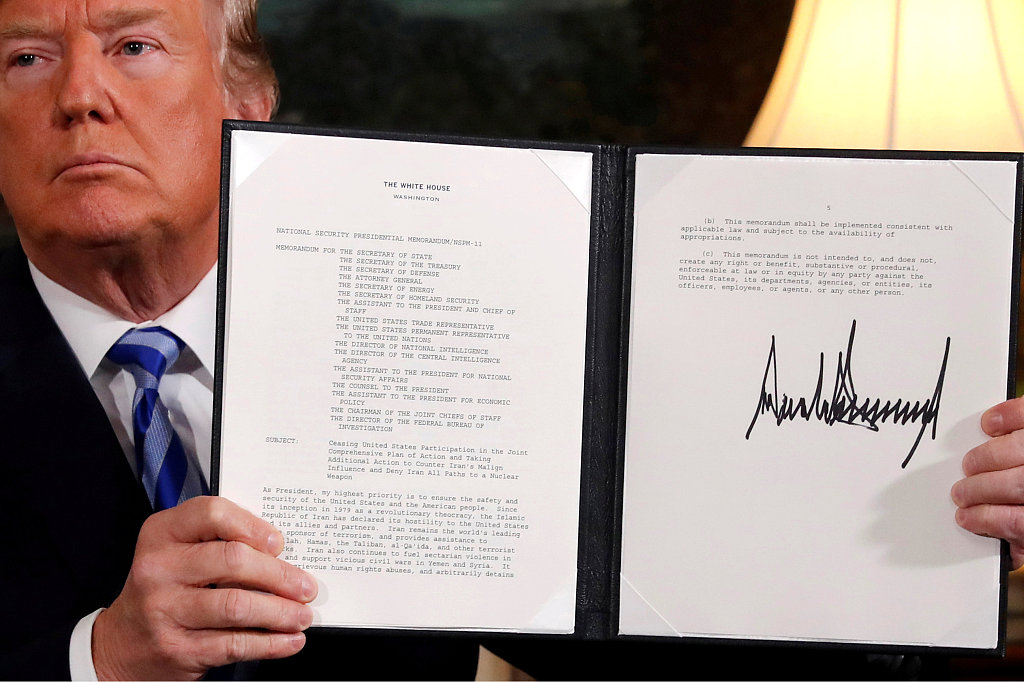
The national flag of Iran. /CFP
The national flag of Iran. /CFP
Editor's note: Bobby Naderi, a special commentator on current affairs for CGTN, is a London-based journalist, guest contributor in print, radio and television, and documentary filmmaker. The article reflects the author's opinions, and not necessarily the views of CGTN.
Iran and the P5+1 group of nations (the U.S., China, the UK, France, Germany, and Russia – along with the European Union) signed the Joint Comprehensive Plan of Action (JCPOA) in 2015. By limiting Iran's nuclear activities in exchange for the lifting of sanctions, the pact attempted to stop Iran from producing nuclear weapons.
Regrettably, the JCPOA was abandoned by the U.S., which prompted the imposition of sanctions. On August 7, 2018, the U.S. reinstituted sanctions against Iran, focusing on industries other than oil like finance, metals, minerals, and cars. Later, on November 5 of the same year, these measures were expanded to cover Iran's shipping and energy industries.
The international community faces the challenge of reviving dialogue and negotiations to promote the full and effective implementation of the JCPOA and achieve a peaceful resolution to the Iranian nuclear issue on the fifth anniversary of these sanctions. The best and most practical strategy for resolving the Iranian nuclear issue is still diplomacy. Several actions can be made to foster diplomatic resolutions and persuade the parties to resume talks:
The power of dialogue
The basic foundation of diplomacy is engagement and communication, which act as platforms for nations to convey their goals, worries, and interests. Dialogue promotes mutual understanding and opens the door to finding common ground. The capacity for meaningful discussion can turn seemingly insurmountable differences into chances for cooperation in the field of international diplomacy.
Conflict can quickly escalate due to miscommunication and misinterpretation of the current dispute. Strong countermeasures, such as effective engagement and communication, can stop misunderstandings from developing into a more serious conflict. Additionally, communication channels offer a path for de-escalation initiatives, enabling parties to pull back from the edge and pursue peaceful alternatives.
The success of diplomatic endeavors depends on fostering a favorable environment for negotiations. This entails developing a forum that promotes polite conversation between all parties while taking into account their genuinely held concerns. A framework can be formed where negotiations are followed with the aim of coming to mutually beneficial solutions by concentrating on shared objectives and similar interests.
International mediation
The participation of mediators who are impartial third parties may aid in facilitating discussions and bridging gaps between the parties. Regional and international organizations like the Shanghai Cooperation Organization and the United Nations may be able to make a significant contribution in this area.
The potential of international mediation to close gaps between parties who appear to have insurmountable differences is one of its main advantages. By skillfully navigating controversial problems, mediators can promote an environment of trust and cooperation. Mediators can elicit concessions and create compromises that might otherwise be unachievable by promoting open communication.
All parties are able to participate in talks with fresh confidence thanks to the impartiality of third-party mediators, which increases the perception of fairness and equity. By ensuring that complaints are voiced, issues are addressed, and solutions are developed cooperatively, this balanced approach increases the likelihood of coming to a thorough and long-lasting agreement.
Under their supervision, mediation guarantees that agreements are accepted and supported by the international community, lowering the possibility of later breaches. Additionally, the endorsement of these organizations strengthens the dedication to multilateral cooperation and peaceful dispute resolution.

Former U.S. President Donald Trump holds up a proclamation declaring his intention to withdraw from the JCPOA after signing it in the Diplomatic Room at the White House in Washington, D.C., U.S., May 8, 2018. /VCG
Former U.S. President Donald Trump holds up a proclamation declaring his intention to withdraw from the JCPOA after signing it in the Diplomatic Room at the White House in Washington, D.C., U.S., May 8, 2018. /VCG
Confidence-building measures
The parties' trust may be increased via initiatives that encourage cooperation, transparency, and verification. Step-by-step implementation of confidence-inspiring measures can create momentum for a full agreement. These programs serve as concrete examples of good faith and are intended to close gaps, reduce tensions, and create an atmosphere that is favorable to negotiations.
An environment of openness and predictability is created when all parties communicate their intentions, actions, and capabilities openly. By disseminating precise and thorough information, misperceptions are reduced, suspicions are allayed, and the basis for trust is strengthened.
What's more, this is a process that develops over time rather than being a single occurrence. The step-by-step implementation enables parties to see each other's adherence to the agreement, progressively fostering confidence and momentum towards more expansive goals. Mutual respect can be built on a pattern of trust and collaboration that can be established through incremental cooperation.
Sanctions relief
In order to show its dedication to a diplomatic settlement, the U.S. may think about relaxing some of the sanctions. This might act as a motivator for Iran to fulfill its nuclear commitments in return. The potential lifting of sanctions offers a rare chance to change the hostile course of events and move towards a more peaceful and secure international system. The diplomatic message it conveys is one of the strongest justifications.
The U.S. would demonstrate its sincere commitment to communication and negotiation by taking into account the partial relaxation of sanctions. This activity can establish the stage for successful diplomatic exchanges by demonstrating a willingness to identify common ground, restore trust, and cooperate towards mutual goals.
Relief from sanctions can act as a potent inducement for Iran to react by upholding its nuclear commitments. Iran might be inspired to take similar actions to uphold its JCPOA obligations as the U.S. displays its commitment to lessening economic pressures. A virtuous circle of collaboration and trust-building can be established by this constructive cycle of action and reaction.
There can be little question that the international community needs to step up efforts to promote discussion and negotiations on the fifth anniversary of U.S. sanctions against Iran. Beyond Iran's borders and the nations directly participating, the JCPOA's rebirth has repercussions. It is a potent illustration of how diplomatic conversations can result in the settlement of complicated international problems. A successful resurrection of the accord strengthens the international commitment to peaceful conflict resolution while also preventing the spread of nuclear weapons.
(If you want to contribute and have specific expertise, please contact us at opinions@cgtn.com. Follow @thouse_opinions on Twitter to discover the latest commentaries in the CGTN Opinion Section.)